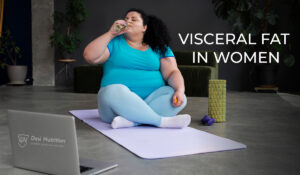Water weight is the stored water that your body stores inside due to various reasons. Water weight leads to temporary weight gain. But you can lose water weight easily as compared to body fat.
An adult body is made of 50-60% of water and you are required to fulfill your fluid requirement throughout the day. When the fluid requirement is not fulfilled, your body stores water which causes bloating.
Water weight is normal and you can reduce it by taking a few precautions. But before that let’s get into what are the major reasons for water weight.

Dehydration:
Dehydration could be a reason for water retention in your body. If you haven’t had enough water throughout the day, your body will store the water already in your body and won’t let it out. This will add to your body weight and make you gain weight temporarily.
High-sodium foods:
High sodium intake can cause puffiness in your body leading you to gain water weight. You are already consuming salt via your regular meals but when you eat junk food or processed or canned food, you are taking a high content of sodium in your body. It increases the amount of sodium that your body requires and to maintain the sodium content in your body, it retains water; hence contributing to weight gain.
Processed carbohydrates:
The body uses carbohydrates to make energy that your body can use to function properly. But when your body consumes processed carbs, it gives your body energy spikes that are temporary. Your body needs a sustainable source of energy to function properly. These sudden energy spurts lead the body to store carbs in the form of glycogen that binds water in the muscles. The more glycogen, the more your body will store water.
Menstrual cycle:
During a woman’s menstrual cycle, hormonal changes start to take place a week before their period begins. So does their craving for sodium, sugar, and carbs. These foods and drinks can result in water retention; increasing water weight.
Certain medications:
Water weight could be the result of certain medications that can increase your water weight frequently.
Medical conditions/medical history:
If you have a medical history that contributes to an increased water weight you will find it difficult for you to remove fluid from your body on its own. Conditions like kidney disease can impact your body’s ability to remove excess water from your body. Cirrhosis, a liver disease, could also be the reason for water retention in the abdomen.
Physical inactivity:
Not moving your body frequently causes water to be retained in the body. You need to move your body as often as you can. Start exercising or start small. For example, start walking or completing 10,000 steps daily. Or indulge yourself in activities that can help to get involved in physical activity. With the help of exercise, you will not only be able to remove water weight but shed off some pounds in terms of body fat as well. If you stick to a balanced diet and exercise routine you can lose up to 2-4 kg of weight in a month.
How to lose water weight?

Now the question arises ‘How to lose water weight?’ Water weight is normal and it fluctuates throughout the day. If you find it difficult to manage your water weight you can follow the below-given tips and adhere to them for better results:
Dietary considerations:
- What you eat and how much you eat plays a vital role in weight fluctuations, water weight or otherwise. You need to keep a check on your dietary approach in order to manage water weight fluctuations.
- The first thing to focus on is consuming a clean diet. A clean diet is sourced from plant-based food. A clean diet is a balanced one. You can choose from a variety of dietary approaches including a keto diet, a vegan diet, a high-protein vegetarian diet, a cultural-centric Punjabi diet or Gujarati diet plans to manage your weight.
- Consuming a proper diet can help you manage your water weight and also help to maintain your body fat by letting you consume nutrition-rich food with a blend of herbal teas and other weight-loss drinks.
- You should focus on reducing high salt intake as it causes bloating. To balance out the sodium intake in your body, you should consume potassium. Bananas are a good source of potassium.
- Avoid foods like chips, crackers, fried chicken or fish, processed sausage, bacon etc.
- On the other hand, include foods like bananas, avocados, and spinach which are rich in potassium.
- Magnesium-rich foods are also going to help you curb water retention. Foods like nuts, whole grains, and leafy green vegetables are great sources of magnesium.
- You also have to keep a check on your intake of carbohydrates. Carbs are stored in the form of glycogen so it can be used in the form of energy, make sure you are not consuming refined carbs that will give your body a temporary source of energy.
- Natural diuretics are also going to help you get excessive fluid out of your body. Eat foods like cucumber, asparagus, watermelon, celery, and parsley that have a high content of water.
- Drink plenty of water to prevent water retention in the body, if you find it a task to drink plain simple water, you always consume the alternatives, like herbal teas, (that have their own health benefits).
Include exercising in your daily routine:
- Exercising is a good option that can help with the reduction of water weight. Burning calories is a great way to reduce weight. And when you are doing so, you are sweating, especially if you are doing cardio. The sweating will help you to take out excessive water from your body.
- You can start out with simple exercises that can help you burn calories and sweat at the same time. Brisk walking, running, swimming (to burn calories), skipping, and cycling are a few exercises that can help you to remain physically active. It is important for you to keep yourself physically active.
- People who want to reduce weight and see results within a week or two should definitely indulge in physical activities and so do women with PCOS and the ones who are looking for ways to manage their menstrual period and avoid bloating.
Practice relaxation techniques:
- Stress, anxiety, and poor sleep schedule could all be the reasons contributing to water retention in your body, especially in the abdomen area. These factors can also lead to weight gain due to overeating, emotional eating, and other reasons for which one consumes food without considering the amount.
- Practice stress management techniques that can help build a stress-free environment around you. Practices like meditation, yoga, journaling, and deep breathing exercises are some ways to manage your stress.
- In order to keep a check on your stress, you need to improve your sleeping schedule. That is the reason for not just stress and anxiety but also weight gain. Poor sleep will make you feel tired and less productive. Make sure you are well rested and to achieve proper rest you should aim for 7-9 hours of sleep without disturbances.
Take supplements for better results:
Supplements like vitamin B6 and magnesium can help reduce water weight. Women who experience water retention as a PMS symptom should consider taking these supplements.
Frequently Asked Questions:
What gets rid of water retention fast?
Ans. You can reduce water retention by drinking plenty of water throughout the day, exercising, eating high-water content foods, taking supplements, managing stress, and sleep schedule. All these ways can help you get rid of water retention fast.
Why am I retaining so much water?
Ans. Water retention is the result of high sodium intake, less water intake, consumption of refined carbohydrates, menstrual periods, or some medical conditions like kidney, liver, or heart disease that do not let the fluid get out of your body. For better guidance, you should consult a healthcare professional who would examine you to know the exact reason why you retain so much water.
Is water retention bad?
Ans. Water retention is a common thing but it could also be the result of an underlying health condition. You should start making a few lifestyle changes like eating clean food and a healthy diet, exercising, and managing your stress and sleep schedule. Even after making these changes you do not see effective results you should consult your doctor.



